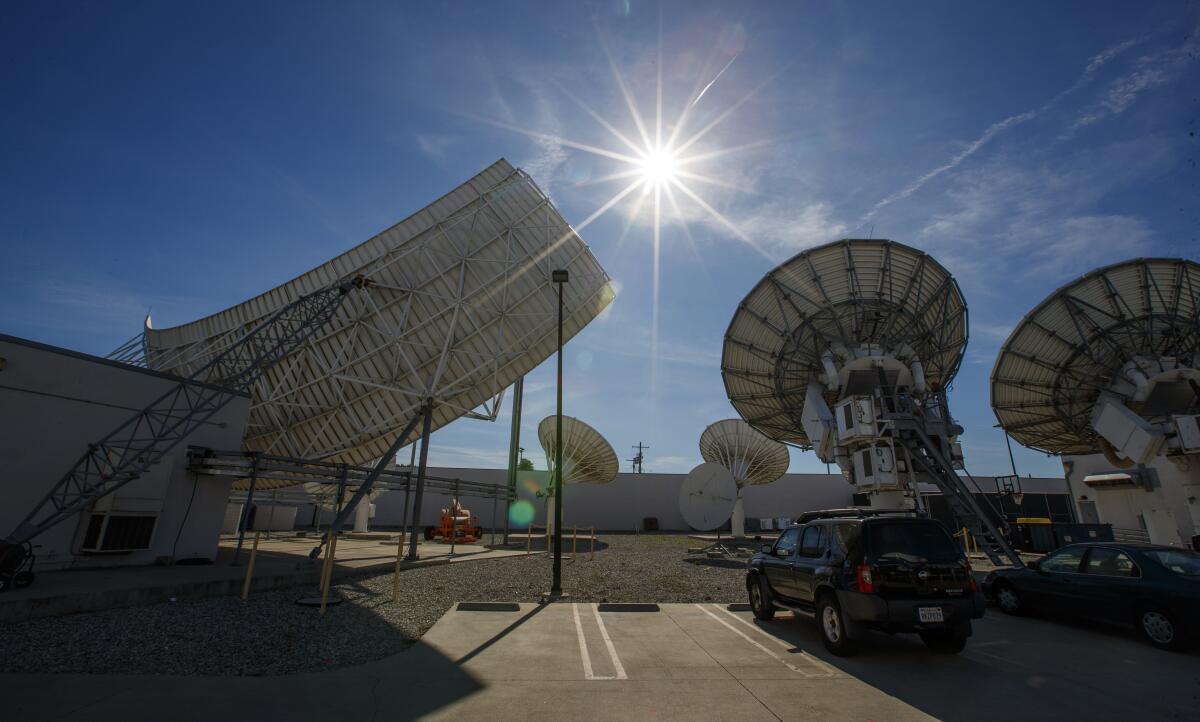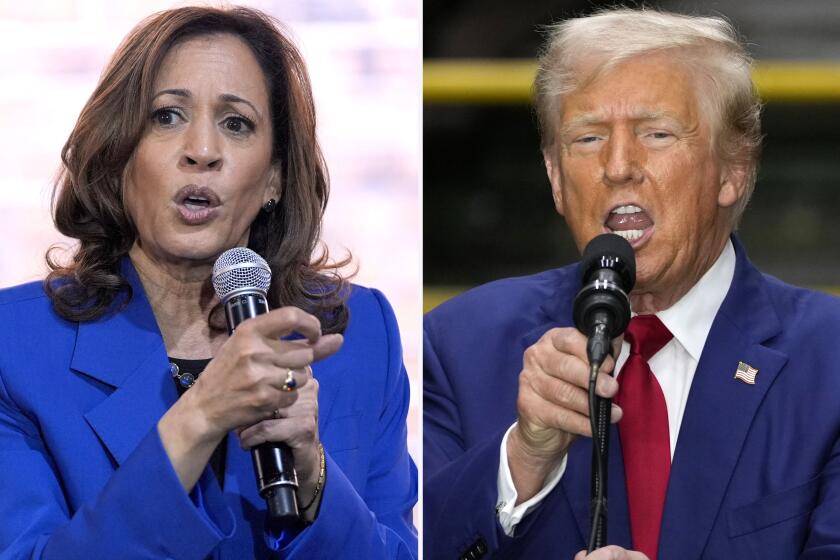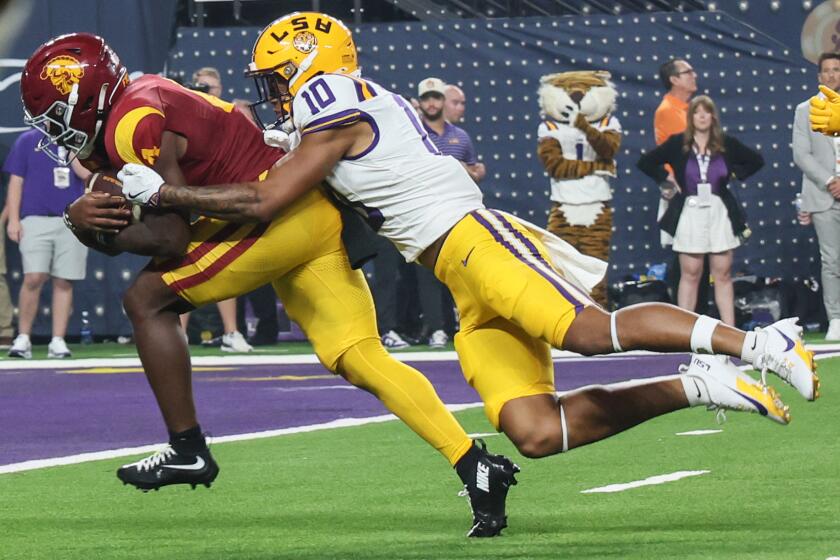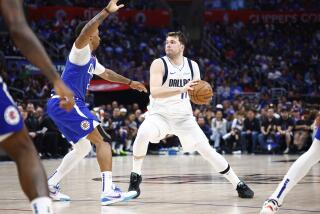DirecTV and Disney reach deal to end ESPN, ABC blackout

- Share via
After a 13-day blackout, Walt Disney Co. and DirecTV settled their contentious contract dispute early Saturday, restoring ESPN, ABC stations and other Disney-owned channels for more than 10 million DirecTV subscribers.
DirecTV and U-Verse customers have been frustrated by the loss of Disney programming since talks broke down Sept. 1.
Both companies were motivated to reach a deal before the kickoff of another weekend of ESPN and ABC college football, ABC’s telecast of the 76th Emmy Awards on Sunday and the second week of ESPN’s “Monday Night Football,” featuring a game between the Philadelphia Eagles and Atlanta Falcons. ABC’s new prime-time season also begins later this month.
The nearly two-week battle has been costly. Thousands of subscribers canceled their service during the blackout, DirecTV acknowledged earlier this week. The satellite TV giant wanted to stop the bleeding.
After marathon negotiations, the companies said they reached an “agreement in principle,” which contains hikes in the fees DirecTV pays for Disney programming. Earlier this week, DirecTV alerted subscribers that it planned to raise prices on some bundles next month due to higher programming costs.
DirecTV came away with wins in the new contract, too. It gained the ability to offer Disney channels in genre packages, including sports, general entertainment and a “kids & family” package. DirecTV also can offer Disney’s streaming services — Hulu, ESPN+ and Disney+ — to customers who subscribe to certain packages as well as on an a la carte basis. That will include the ESPN streaming service that Disney plans to launch next year.
“Through this first-of-its-kind collaboration, DirecTV and Disney are giving customers the ability to tailor their video experience through more flexible options,” the companies said in a joint statement. “DirecTV and Disney have a long-standing history of connecting consumers to the best entertainment, and this agreement furthers that commitment by recognizing both the tremendous value of Disney’s content and the evolving preferences of DirecTV customers.”
Walt Disney Co. proposed a partial detente (at least for Tuesday) as the blackout of its channels on DirecTV and U-Verse stretched into its 10th day.
The dispute underscored the strain facing traditional pay-TV distributors amid the shift to streaming.
A shrinking pool of big-bundle subscribers increasingly has been asked to shoulder higher programming expenses.
The cost of carrying broadcast channels (ABC, CBS, Fox and NBC) and sports networks, including ESPN, has skyrocketed; programmers look to pass on fee increases they’ve agreed to pay sports leagues. ESPN is the most expensive basic cable channel, costing pay-TV distributors nearly $10 a month per subscriber home.
Sports costs became a major rub in the recent dispute. Another sticking point was Disney’s requirement that its channels be available in most of the DirecTV and U-Verse homes.
Disney has long demanded that its channels reach about 90% of DirecTV’s subscriber base. ESPN’s minimum threshold is around 82%.
Pay-TV companies such as DirecTV must pay penalties if they fail to meet that “minimum penetration.”
Heading into negotiations, DirecTV girded for battle with a goal of relaxing those thresholds. DirecTV wanted looser requirements so it could offer its customers smaller, genre-themed bundles at lower prices.
DirecTV executives argued that it was unsustainable to force customers to buy a “bloated bundle” filled with expensive channels they don’t watch. Most consumers watch fewer than 30 channels, they said.
Disney countered that programming is expensive and that it has been investing heavily in high-quality content.
The ABC and ESPN blackout on DirecTV — affecting nearly 11 million homes — comes during a busy sports calendar with college football, the NFL and the U.S. Open tennis tournament.
Neither side was eager to prolong a battle that antagonized customers. Already, more than 4 million U.S. customer homes dropped pay TV in the first six months of the year, according to research firm MoffettNathanson.
Disney and DirecTV still generate billions of dollars in revenue from traditional pay-TV packages and they want to keep the spigot running. Disney receives about $2 billion a year from DirecTV, MoffettNathanson said.
Unlike cable distributors that also offer high-speed internet and phone service, DirecTV is focused solely on selling video channel packages, including U-Verse, since the company’s 2021 spinoff from AT&T. The El Segundo firm, which has lost more than half of its subscribers from a decade ago, could ill afford to chase away more customers and began offering $30 credits to encourage them to stay during the blackout.
Disney pulled its channels from DirecTV and U-Verse on Sunday, just minutes before a highly anticipated USC-LSU college football game. DirecTV has offered credits to customers as the blackout reflects building tensions in the TV industry.
Early on, Disney said it was willing to work with DirecTV to craft genre-themed bundles, such as children’s and family entertainment, local broadcast stations and sports.
“Disney talking openly about smaller bundles is a major inflection point strategically and likely points to where the industry is ultimately headed,” Lightshed Partners media analyst Rich Greenfield wrote in a report.
But the two companies spent days haggling over the penetration rates. Negotiators spent long hours trading proposals since the blackout began, despite trading barbs publicly.
Blackouts have become increasingly common as industry economics erode. Last year, Disney channels went dark for nearly 12 days on Charter Communications’ Spectrum service during a similar tussle over fees and flexibility to offer Disney’s streaming services to its customers at no additional charge.
Charter, DirecTV and other distribution executives have chafed at Disney’s efforts to bypass distributors to offer its programming directly to consumers. Disney plans to roll out ESPN as a streaming service next year.
The Burbank giant also teamed up with Warner Bros. Discovery and Fox Corp. this year to offer a $43-a-month package of sports channels called Venu. But last month, a federal judge granted a temporary injunction, scuttling the fall launch of Venu, on antitrust grounds.
Distributors view such services as direct threats to their businesses.
DirecTV Chief Content Officer Rob Thun also said that Disney’s general counsel asked DirecTV to waive any legal claims against Disney that allege antitrust behavior as part of any distribution deal. That, too, became a sticking point during negotiations.
Last weekend, DirecTV filed a complaint with the Federal Communications Commission alleging Disney has not been negotiating in good faith and its tactics were anticompetitive.
More to Read
Inside the business of entertainment
The Wide Shot brings you news, analysis and insights on everything from streaming wars to production — and what it all means for the future.
You may occasionally receive promotional content from the Los Angeles Times.














